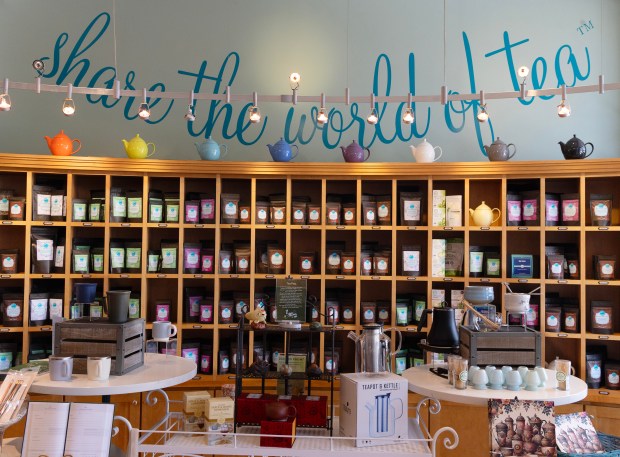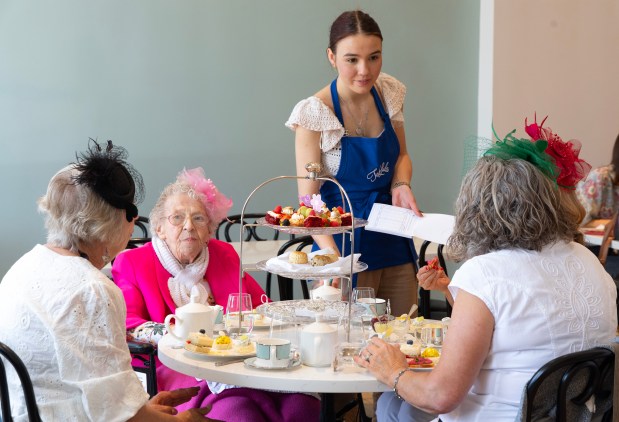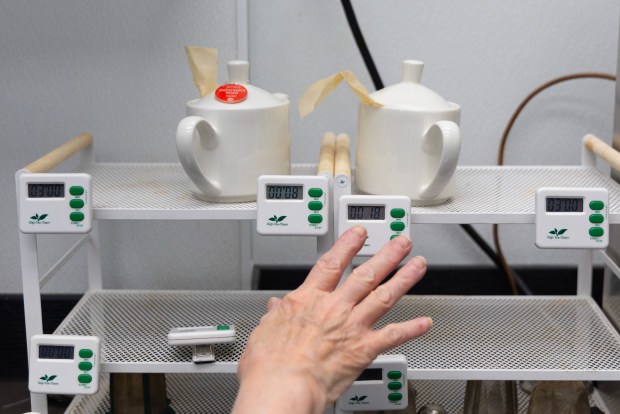When Marco Namowicz planned the first casual tea hangout for the Chicago “CommuniTea,” he had no idea what to expect. Just in case the event went bitter, the longtime tea educator and retail operations manager at Argo Tea pulled out board games and projected a tea documentary on the walls of Living Water Tea House in Chicago’s Little Italy.
Six hours later, the event proved sweet. Attendees enjoyed live music and delicate tea gelato in the tranquil ambiance of the contemporary tea parlor, while soaking up conversations and tea from East Asia in flavors such as rich pu-erh, warm oolong and graded Japanese matcha.
As a larger group of tea enthusiasts and professionals bonded over cup after cup, the Chicago Tea Collective sprang to life. From casual meetups and educational workshops to monthly CommuniTea nights and more, attendees have brewed up friendships and traditional Asian tea flavors for the past two years. It’s now a space where anyone can bring a cup full of curiosity to the table, Namowicz said.
On a CommuniTea evening, dry and wet leaves are passed around so people can smell and touch them. In just a matter of minutes, hot water works its magic on the leaves, creating amber liquid with a floral taste.
Assigned roles, based on practices Namowicz picked up from a Chinese teahouse, ensure everyone can play a part. The designated pourer makes sure everyone has their cup, and a runner might change out the waste bowl and bring more water. The holistic experience makes the brewing of tea feel like connecting with an old friend, Namowicz said. There’s the familiarity of a set ritual, but also constant surprise in the way flavor notes and aroma change with every infusion.
Shaolong Jiang, founder of Living Water, recalled how teahouses in Asia traditionally centered on the community, where people actively shared with one another. But building a community rich in conversation and connection is never easy, Jiang said. He was nervous about opening a teahouse in Chicago. The endeavor has been nothing short of an adventure since 2020, filled with tea-based artistic, literary, comedic and musical collaborations.
Jiang said keeping his teas rooted in tradition also reaffirms his identity as a Chinese immigrant. In a world where boba teas and sugary drinks loom large, there’s nothing more humbling than a traditional tea practice that simultaneously connects him to the past and present.
“The way to appreciate it is to leave it as it is,” he said. “You can’t beat Mother Nature.”
Traditional tea practices, such as gongfu cha from China, activate all the senses. In a practice that emphasizes brewing tea with discipline and skill, every small detail becomes important, from the semi-porcelain clay of a brown pear pot that helps with heat dissipation to the hand-painted gaiwan bowls arranged on a table.
Gongfu cha involves infusing a large amount of leaves in a series of short steeps that progressively get a few seconds longer. The cups of liquid are decanted and consumed one after another. Unlike other brewing methods, which concentrate a tea’s full potential into one serving, this practice makes each cup an exciting and unpredictable journey of its own. With each steep, a new flavor or aroma is unlocked, but without the bitter astringency that accompanies longer steeps.
Jiang isn’t the only one harnessing the dynamic journeys of ancient tea practices as a way to build community and connection.
In Park Ridge, Sheila Duda is facilitating a similar environment. As the founder of TeaLula, a tea shop now celebrating its 16th anniversary, she’s witnessed how tea has reached far beyond gender and age stereotypes. At any moment, she’ll see eighth graders coming in after school, a table of businessmen or a father sharing a cup with his daughter.
In 2023, Duda started a tea experience designed to foster meaningful connections and conversation. During afternoon tea, hearing the chatter of people and the clinking of their tea cups feeds her soul, Duda said.

What also feeds her soul, and elicits a tear or two? The countless memories that TeaLula has brewed for community members. She remembered how a young woman would always come drink tea by the front window with her father-in-law. A while later, she received an unexpected call.
“She just said, ‘My father-in-law passed, and I am so grateful I have the memories of being here with him — the two of us, over a cup of tea, just sharing with one another,’” Duda recalled. “That really touched my heart, that we did have that kind of impact.”
She also vividly recalled how a man came in for a tea tasting on a busy day mid-week. Despite being short-handed that day, Duda set up multiple tastings, and conversations about tea characteristics soon stretched into talks about life and love for several hours. When it was all over, the man explained how that day was the anniversary of a divorce that left him devastated.
“And then he said, ‘Now, it’s become the best day. I can look back on this day as not the worst day of my life, but a day where I came and I enjoyed tea with a stranger,’” Duda recalled. “Those are the stories that change everything. It’s more than the tea shop.”
Tea not only can create a space for deep conversations but also transport one to a place they’ve never been before. Just a few sips and one might imagine themselves on the mountainous, damp tea estates in Sri Lanka or India at dawn.
When Duda visited those sprawling, green fields, she got a firsthand look into the difficult labor that harvesters experienced and how much of a role climate plays in the taste of leaves. Those trips reinforced her belief in ethical and sustainable sourcing, and photos of her trips around the shop are a continual reminder of the journey from garden to cup.
“You can’t pass those pictures without taking a moment and remembering the people who have toiled to give you this simple, elegant beverage that’s going to blow your mind,” Duda said.
Despite certain misconceptions about the bitter taste of tea, Duda, Jiang and Namowicz argue that there’s a tea out there for everyone. Finding it becomes a matter of experimentation, where changing factors such as time and temperature can completely alter a tea’s taste.
For instance, Duda said she’ll purposely oversteep some tea to demonstrate those elements.
“This woman once said, ‘Oh, this is what my green tea tastes like — it was bitter!’” Duda recalled. “I’m like, ‘All you have to do is cool down the temperature.’ Now she’s like, ‘I could drink this all day.’”
At TeaLula, Duda emphasizes how past interests help staff guess what people might like. A clue as simple as knowing whether people enjoy pumpkin pie instead of apple pie may suggest that they’ll love a savory or spicy taste in tea, like a chai.

Within the Chicago Tea Collective, creating accessible and inclusive spaces, free of complex jargon, is key. That’s why the monthly CommuniTea gathering remains a donation-based event, where no one will be turned away for lack of funds. Everyone is invited to share a cup, no matter where they are on their journey with tea.
“The big thing is allowing people to bring whatever’s in their cupboard to the table,” Namowicz said. “Let’s not make it where you have to buy this tea from this vendor or anything like that. You have everything you already need. Let’s utilize what you’ve got and do something and enjoy tea on a deeper level.”
Jenna Wang is a freelance writer.





